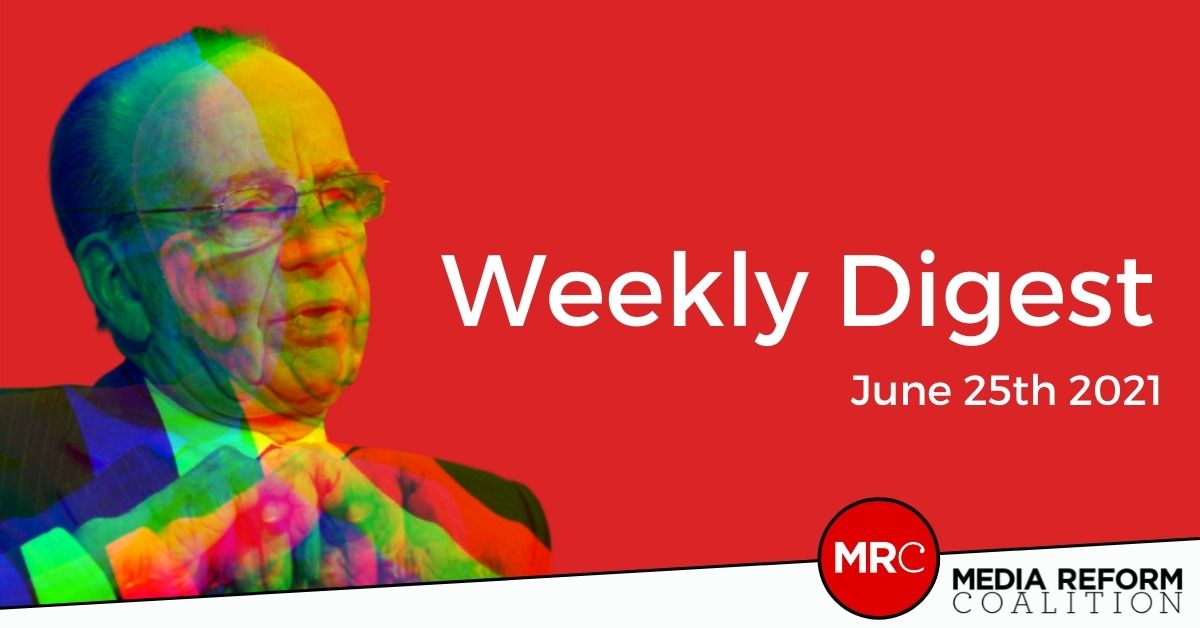Hi everyone, Eliz Mizon here with the Media Reform Coalition blog every Friday.
For even more media news and analysis, plus the latest campaigns, content, and UK media jobs, follow me at Chompsky: Power and Pop Culture.
For now, here’s your media news digest!
The BBC and Beyond campaign continues…
On Tuesday we held another Town Hall event – “The nation’s quarrel with itself: public media and constitutional crisis”, jointly organised with Ulster University. We had a great range of speakers who addressed the lack of representation of the different parts of the UK to one another, and the consequences for Northern Ireland as well as for issues such as Welsh independence. The conversation stressed the need for more nuanced coverage of complex constitutional questions, and a wider plurality of voices and positions to be heard across the media landscape. We had over 3600 viewers across different platforms – if you missed it you can catch up with it on our YouTube channel! We have two more events coming up next week, and a third confirmed for mid-July:- Monday, June 28th, 6pm – Scottish media, for everyone? (with Pass the Mic)
- Thursday, July 1st, 11am – Reimagining public service media in Wales (with the Institute for Welsh Affairs) REGISTRATION REQUIRED
- Wednesday, July 14th, 6pm – Can public media be antiracist?
An Open Letter to Priti Patel: #Leveson2Now
After the Daniel Morgan murder report was released, showing clear collaboration between the police and the Murdoch and Mirror Group press in interfering with the murder investigation, Hacked Off and other campaigners, including Daniel’s brother Alastair, are calling ever more loudly for the reinstatement of ‘Leveson 2’. The second part of the Leveson Inquiry into the culture and practices of the press was cancelled by then-culture secretary Matt Hancock in 2018. Sign the Open Letter to Demand #Leveson2Now This week I spoke to co-founder of innovative local newspaper The Bristol Cable, Adam Cantwell-Corn. He spoke about the need for the industry to change, focusing on how to get people to pay for journalism again, and the ways in which this small paper has thrived while the industry has continued to struggle. READ: Praxis Makes Perfect: Adam Cantwell-CornThis Week’s Media News
- Culture secretary Oliver Dowden is considering a request from Rupert Murdoch to abolish rules around his relationship to editors of the Times and the Sunday Times. Legal restraints were put in place when he bought the papers to prevent him from interfering in their editorial independence; he now argues these are outdated in the digital age. (The Guardian)
- Dowden will also be considering regulation of streaming services (e.g. Netflix, Amazon Prime) by Ofcom, bringing them under the same rules as traditional broadcasters (e.g. BBC, Sky) such as a requirement for impartiality and accuracy rules for documentaries and factual content. This comes ahead of a white paper due in the autumn concerning the country’s public-service broadcasting more generally. (Gov.uk)
- Google has announced it’s delaying its plan to block third-party cookies in the Chrome browser until late 2023. The company says it still needs to determine “how to protect users while providing web publishers a way to make money.” (CNet)
- The EU Court of Justice has ruled that YouTube (and by extension, other online platforms) is “not liable for users uploading unauthorised works unless the platforms failed to take quick action to remove or block access to the content.” (Reuters)
- After hedge fund Alden Global Capital bought the US publisher Tribune a few weeks back, the results of their cost-cutting is beginning to be felt. Around 100 staff are thought to have taken the voluntary buyouts suggested by Alden; with that loss of staff, Tribune papers have been told to “slash local and feature pages by 20 percent, move up their deadlines by as much as two hours and that most of the special sections should be put on ‘pause.’” (NYPost)
- The US has ranked last for trust in news outlets among 46 countries surveyed in the annual digital news report from the Reuters Institute for the Study of Journalism at Oxford University. Other countries saw a general upswing in trust, likely a result of COVID coverage, but the US saw only 29% of people respond positively. Finland led the board at 65%. (Poynter)
- Three Al Jazeera journalists who were tear-gassed during the Ferguson protests after Michael Brown’s death in 2014 will receive $280,000. They settled a lawsuit with St. Charles County whose SWAT team fired the tear gas. (AP)
- Yet another media union is to be formed: the Washingtonian, a D.C. based magazine focused on the area’s happenings. (The Hill)
- The UK is set to ban junk food adverts online, and on television before the watershed. It’s estimated this could cost broadcasters more than £200m a year. (The Guardian)
- Several airlines are ditching in-flight magazines in light of the growing ubiquity of digital media, and to lower emissions. The move will not only save paper but make planes considerably lighter. It’s the latest in a string of cost-cutting exercises the industry has undertaken over decades. (Wall Street Journal)



